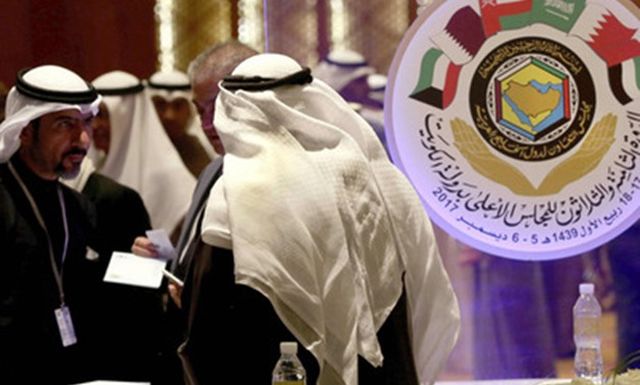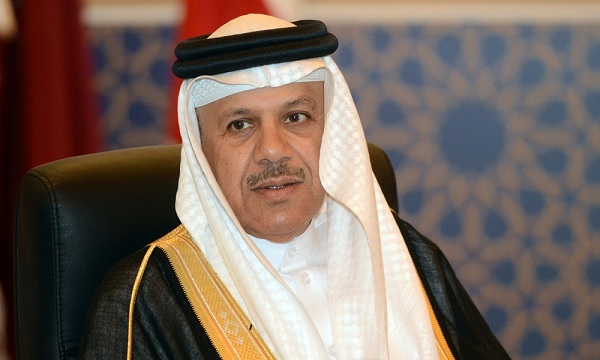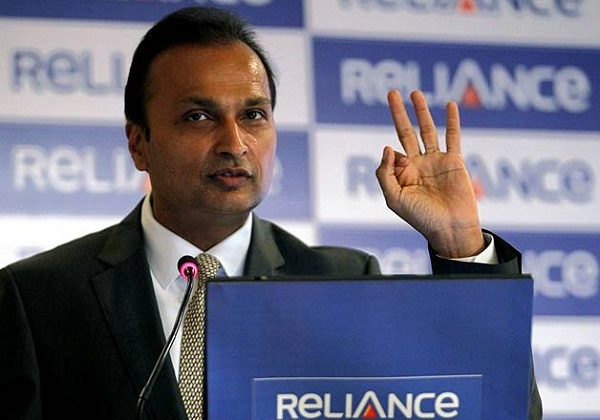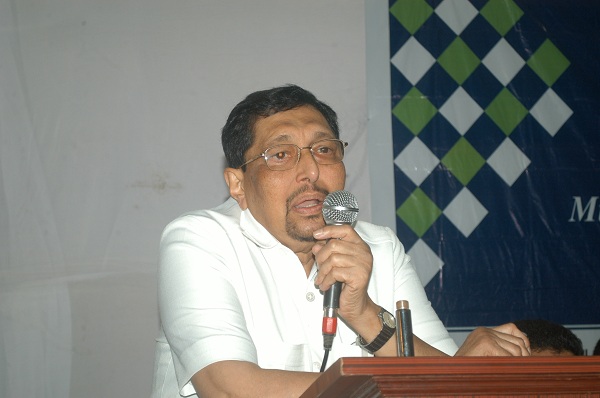
by admin | May 25, 2021 | Business Summit, Events, Muslim World, Social Round-up
 Kuwait : The 38th annual summit of the Gulf Arab heads of state will convene here on Tuesday and Wednesday, officials said, despite an ongoing dispute between some members of the group.
Kuwait : The 38th annual summit of the Gulf Arab heads of state will convene here on Tuesday and Wednesday, officials said, despite an ongoing dispute between some members of the group.
A rift between the Gulf Cooperation Council members Saudi Arabia, Bahrain and the United Arab Emirates (UAE), on one side, and Qatar on the other has put this year’s annual meeting in doubt, Al Arabiya reported.
The crisis, which began in June, revolves around allegations by Saudi Arabia, the UAE, Bahrain and Egypt that Qatar supports terrorism, a charge Doha denies. Qatar says the four countries were trying to force Doha to fall in line with their own foreign policy views.
Qatar’s Foreign Minister Sheikh Mohammed bin Abdulrahman al-Thani met his Gulf Arab counterparts on Monday ahead of the summit, one of the highest official encounters since some of them cut diplomatic, trade and travel links with Doha.
Al-Thani said that Qatari Emir Sheikh Tamim bin Hamad al-Thani would attend the six-nation Gulf Cooperation Council (GCC) meeting, despite the dispute within the group.
—IANS

by admin | May 25, 2021 | Muslim World
 Dubai, (IINA) – Gulf Cooperation Council (GCC) Secretary General Abdullatif Al-Zayani called upon the Arab countries on Monday to adopt a clear vision and objectives to achieve the desired future and overcome the difficult stage witnessed by the Arab nations, WAM reported.
Dubai, (IINA) – Gulf Cooperation Council (GCC) Secretary General Abdullatif Al-Zayani called upon the Arab countries on Monday to adopt a clear vision and objectives to achieve the desired future and overcome the difficult stage witnessed by the Arab nations, WAM reported.
Speaking at the World Government Summit in Dubai, Al-Zayani called on Arab governments to focus their efforts on five key challenges to prepare itself for the future.
He said that the first challenge is to reunite the nations, he said: ”The Arab world must prepare itself for the future and retrieve it’s unity again and speak with the same voice”.
He added that the second challenge is to provide a safe environment in the region. “Arab nations should provide a safe and secure environment for all Arab citizens”.
The third factor was abolishing terrorism, he said: “Arab countries should eradicate terrorism and fight it by drying up terrorist funding and putting an end to all atrocities by adopting an international police, media, economic and in all fields, local, regional and international cooperation”.
Regarding the fourth factor, he said, “There is a need to mobilize Arab governments and people to provide assistance to millions of displaced population and refugees from Palestine, Syria and Libya. We cannot accept Syrian children dying of hunger and war or drowning in the Mediterranean. We need unified efforts to provide human relief to all”.
The fifth factor was regarding the rebuilding of cities and ties, Al-Zayani said that Arab nations must ensure peace in the Arab world and national reconciliations. “We will need to reconstruct a lot of Arab countries so the Arab people will live with more hope in the future and enjoy human rights”, he said.

by admin | May 25, 2021 | Muslim World

Anil Ambani
Mumbai:(IANS) Reliance Defence Ltd (RDL), a subsidiary of the Anil Ambani-led Reliance Infrastructure (RInfra), said on Monday it has signed a MoU with Abu Dhabi Ship Building (ADSB) for construction of naval ships for the Gulf Cooperation Council over the next 10 years.
“Under this MoU, RDL and ADSB are investigating the opportunity to set up a strategic partnership for the construction of naval ships – including frigates, destroyers and other specialized vessels – to address the Gulf Cooperation Council (GCC) over the next 10 years,” said a Reliance Group statement here.
The agreement could also see ADSB delivering maintenance, repair, overhaul and refit services to the vessels, in line with regional requirements, it said.
Abu Dhabi Ship Building is a provider of construction, repair and refit services for naval, military and commercial vessels.
The Reliance Group is likely to use its newly acquired ship-building facilities at Gujarat’s Pipavav for this partnership.
In March, the Reliance Group had announced its acqusition of a 18-percent stake from the then promoters of Pipavav Defence, apart from a 26-percent mandatory open offer.
Pipavav’s facility is at the location by the same name on the Gujarat coast and claims modern, versatile engineering and fabrication facilities with shipbuilding infrastructure that is also suitable for the construction of a wide range of warships and submarines.
The company is said to be a strong contender for a tender, potentially worth Rs.60,000 crore, to build six advanced submarines for the Indian navy along with five other private and state-run firms such as Larsen and Toubro, Pipavav Defence and the state-run Mazagon dockyard.
The MoU follows the joint statement issued during Prime Minister Narendra Modi’s recent visit to the UAE, which highlighted “cooperation and manufacture of defence equipment in India”, the company said.

by admin | May 25, 2021 | Interviews

Owner of A to Z Diagnostic Centre Dr.M.A Patnakar
People welfare trust‘s pioneer Dr.Mohammad Ali Patnakar is a well known figure of Mumbai in social arena. His institution is certified by Gulf Cooperation Council (GCC) and has branches in most of the states in the country. Mr.Patnakar is a medical practioner but he has also been association with many social and welfare institutions. To establish central treasure (Markazi Baitul Maal) is considered one of among many initiatives. He has deep insight on manpower business. He shed light on various aspects of business in a conversation with Danish Reyaz. Here are some excerpts…
Maeeshat: people face many troubles in overseas business every day. How do you expect the future in this regard?
Patnakar: in the business of overseas or manpower after Saudi Arabia and Kuwait, Qatar is considered important leader. Most of the manpower is being supplied to these countries from India. But the tragedy is now a days that West Asian countries are facing new and fresh challenges. Issue of Egypt and Palestine has an impact on Islamic countries while ISIS is busy in waging war in Iraq and Syria. It all has a negative impact on the economy of the region.
Second problem is that Arabs seek twenty percent ‘Khaddamah’ (lady servants). Who supply more khaddamas was able to get more jobs. But many complaints have been registered so consulate issued new orders to send them. Now to send Khaddamah become a hard nut to crack. And it resulted less attention of Arabs towards India because they pay more heeds to the countries from where they get more khaddamas.
Third major problem is that most of south Indian people used to go Kuwait but when Kuwait increased medical fee up to 24 thousand then only those whose visas were about to expire went there out of compulsion otherwise poor and less privileged people decided not to go. So just because of wrong decisions of Kuwait government authorities manpower business gets loss and decreased there.
But keeping all this aside, India’s economic condition is also getting better. See for example in my village where labour used to work in just ten or twenty rupees per day but you could hardly find any labour even if you pay one hundred or two. Let alone lady servants you could not find labour men very easily. So I think future of overseas business if not so bright then it is also not so dark and despairing. There are possibilities to get conditions better.
Maeeshat: when Kuwait started ‘Khdmat services’ for medical checkups and increased its fee up to 24 thousand for the same. Muslim Mirror and Maeeshat published the reports and in result they withdrew increased fee and again started medical in old rate. How do you see this whole process?
Patnakar: Role played by Muslim Mirror and Maeeshat is worth mentioning. I congratulate Maeeshat and its team for doing this job and to get heard by Kuwait Consulate and embassy. We are also thankful to GCC and GAMCA for giving us this opportunity again and I hope this will continue in the same way. Maeeshat gifted us a precious thing in Ramadan i.e. opportunity to conduct medical checkups and to send people abroad for employment. And people who were avoiding to go abroad for higher fee they are also happy now.
Maeeshat: There is a general perception that central government is trying to poke its nose and interfere in business and economy of Muslims including overseas business. Do you this is true?
Patnakar: As for as present central government and current situation are concern I think that ‘middle man’ is trying to defame the government. Prime minister of the country Mr. Narendre Modi has told that he is a prime minister of 120 crore Indians. So I hope he will keep his promises and stick to his slogan of ‘sab ka sath, sab ka vikas’ (support of all, development for all). But I will also say to Mr.Modi that when he comes back from his foreign trips he should interfere in internal affairs of the country in order to control miscreants and bad elements.
On the other hand Muslim community should take advice from each others and should avoid mischievous things in order to maintain harmony and tranquility in the country. By the policy of advice with each other we can urge states and central governments to work for us because by the same strategy we conquered Makka in Prophet Period. Muslims must not indulge themselves in violence anyhow. If we have given sixty years to Congress let us experiment BJP at least for sixty months in a hope that they will keep their promises.
Maeeshat: does ‘Make in India’ and ‘Make in Maharashtra’ campaign have any negative impact on overseas business because people get employment in their homes?
Patnakar: even after ‘Make in India’ and ‘Make in Maharashtra’ campaign there is no low tendency in going abroad. But here it also should be very clear that companies of west Asia issue more visas to the people from India, Pakistan, and Nepal etc and when they send exchange money to their countries they also contribute not less than any industrialist in the country. If exchange money comes to any country it makes direct benefit to that country. So government should provide more opportunities to the people to work abroad so they can contribute in the economy of the country. It is also important to note here that majority of labour class go overseas for employment. In this way we are decreasing unemployment in the country and at the same time we are able to control black money as well. Because I think whatever money comes this way is considered white money. If it is not coming this way we should find easy ways for it.
Maeeshat: Business of recruitment and manpower is infamous in the eyes of common man. People complain that they have been cheated and misbehaved by agents. What is the reason behind it?
Patnakar: Business of manpower is infamous because of agents. People generally don’t have good opinions about middle men who work with us but this business can’t run without middle men. Hence we can say middle men are compulsion and we have no choice. But people who have licenses try their level best to avoid any such occurring but it happens sometimes without choice.
One of the reasons behind it is the Arabs who send visas also ‘demand’ fee and agents in India also take their fee from their clients. Sometimes when they go abroad and won’t get desired and promised job they refuse to work. Its bad consequences have to face whole fraternity. If visa senders and Indian agents leave the middling they situation can improve and get better. I think we have to sort out this problem with good agents because I see Non-Muslims who run this business their agents are better and no complaints received about them.
Maeeshat: according to your view, economy in India is improving and going better but Muslims condition seems pathetic. How can we solve this problem?
Patnakar: we can’t dent this fact that our country’s economy is improving and at the same time this also undeniable fact that Muslims getting weaker economically. Reason is that we did not establish public treasures (ijtemai Baitula Maal). Huge amount of Zakat money is being wasted and did not serve the purpose for the community. If we can utilize this money this pathetic condition may be eliminated.
An advocate from South Africa Abu Bkar who was appointed ambassador to 21 Muslim countries by Nelson Mandela narrated to me his experience that sound really cool. He said that once he was in Pakistan and there a doctor narrated him an incident saying that once he was in his clinic, a lady came to him and demanded some money for education of her children. After some years same lady came to me to return my money and said” now my children started working please take this money back”. Doctor told that I asked whether there are other women like you who want support to become able to earn their bread. That lady replied that yes there are so many women if anyone would support them they can earn their livelihood. According to the doctor “we started helping those needy women and now it become a huge caravan”. Advocate Abu Bakr adopted same method in South Africa and now under this scheme around one lac forty five thousand families became skilled and are able to earn their livelihood. If this same pattern adopted in India also I think many people can stand by their own and earn their bread.
Translation: Asim Mahmood

 Kuwait : The 38th annual summit of the Gulf Arab heads of state will convene here on Tuesday and Wednesday, officials said, despite an ongoing dispute between some members of the group.
Kuwait : The 38th annual summit of the Gulf Arab heads of state will convene here on Tuesday and Wednesday, officials said, despite an ongoing dispute between some members of the group.


